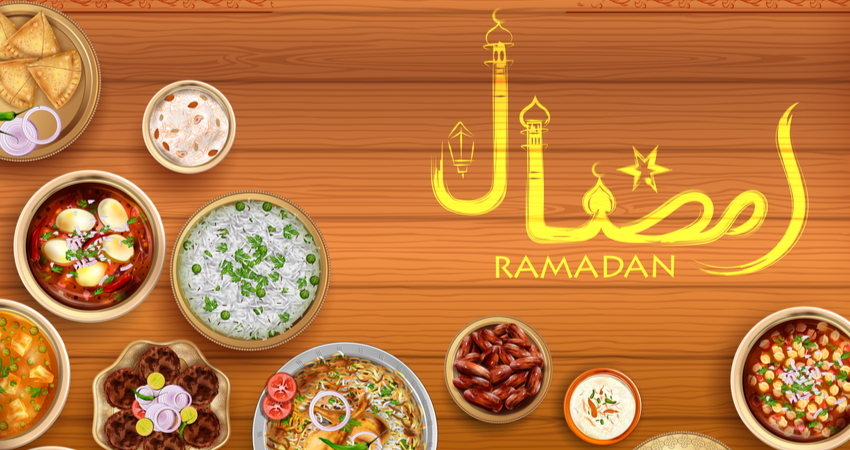The holy month of Ramadan is when Muslims around the globe fast during the daylight hours for 29-30 days. Muslims observing fast in Ramadan do not eat or drink anything during the daylight hours. They only eat two meals – one is Sehri just before dawn and another is Iftar after sunset. Popular Ramadan food and dishes for these meals differ across countries. However some are common to most geographies and cultures. The end of Ramadan is marked by Eid-ul-Fitr when a special celebratory meal is eaten, which is the first meal eaten during the daylight hours after a month.
Recommended Ramadan Meals
Ramadan food and meals should essentially be healthy eats so that nutritional needs of the body are met even while fasting. To do this, it is advisable to make sure that the food is packed with essential nutrients like proteins, vitamins, carbohydrates and minerals. Since Sehri and Iftar need to provide sufficient sustenance all through the day. Also, it is necessary to stay hydrated and drink enough water. Adults should drink two to three glasses of water per hour from Iftar to Sehri.
Some of these dishes are also exclusively served only during this holy month of fasting. The majority of these dishes are loaded with complex carbohydrates and are low in sugars and fats. Foods with hydrating properties are common, whereas spicy dishes are usually avoided.
How to plan your morning and evening meals?
Sehri: Even though the Ramadan morning meal is a relatively simpler affair, it should still be wholesome enough to provide sufficient energy to last through the rest of the day of fasting. For breakfast during Ramadan, it is advisable to drink plenty of fluids and choose fluid-rich food in order to stay hydrated during the day ahead. Also, it is wise to go for Ramadan food that is high on starch to build energy levels. It is a good idea to choose whole grains or high fibre food, which can make a person feel fuller and aid in digestion.
Iftar: For the Ramadan evening meal, it is advisable to go for plenty of fluids, food items containing some natural sugars and low-fat, fluid-rich foods when first breaking the fast. Usually, Iftar includes items from all food groups such as fruits and vegetables, nuts, beans/meat, grains and dairy. Ideally, Ramadan food for Iftar should provide a balance of protein-rich items such as meat, eggs, fish and beans and starchy ones like whole grains, fruits, vegetables and dairy products. Also, it is advisable to restrict the amount of sugary and fatty foods, as well as sugary drinks.
Top 10 Ramadan Food Preparations
There are many delicious and nutritious dishes served during the holy month of Ramadan. Many of these dishes are an excellent addition to Sehri meals while others are more suitable for Iftar. So, here is the list of popular foods during Ramadan:
Popular Sehri Dishes
- Ful Ramadaan: Made with cooked fava beans, lemon juice, olive oil and garlic, this traditional bean stew is a variation of Egypt’s national dish ful medames.
- Egg Brik: Counted amongst the best foods for Sehri in Ramadan, this dish involves a whole egg in a triangular pastry pocket topped with chopped onion, harissa, tuna and parsley.
- Afghani Bolani: Serving as an excellent delicacy for Sehri meals, this lip-smacking flatbread from Afghanistan is stuffed with baked potatoes, herbs and onions.
- Fresh Fruit Salad: When it comes to having a delicious, nutritious and hydrating breakfast, nothing can beat fresh fruit salad, especially during Ramadan with a whole day of fasting looming ahead.
- Porridge: This all-time favourite breakfast option serves just as well during Ramadan as it does during the rest of the year. Usually made from milk, muesli and water, it is light, nutritious and fulfilling enough to become a popular Ramadan breakfast dish.
Popular Iftar Items
- Dates: Iftar traditionally starts with eating dates. It is believed that Prophet Muhammad (PBUH) broke his fast with dates and camel milk during Ramadan. Dates are a rich source of fibres, sugars, slow carbohydrates, potassium, magnesium and vitamin B6.
- Shorba: Very popular in the Middle East region, this delicious lentil soup is a nutritious blend of beneficial vegetables and is rich in proteins. Also called Arabic lentil soup, it serves as an excellent appetizer for breaking the fast.
- Keema Samosa: Counted amongst the most popular Iftar treats in India, keema samosa is a crispy fritter with a flavourful filling of minced mutton meat along with an array of spices like ginger, chillies, mint and garam masala.
- Haleem: This delectable stew is an Iftar favourite and contains fresh mutton meat slow-cooked with lentils, cracked wheat and a variety of aromatic spices.
- Kebabs: From ground meat wrapped around an iron rod to chunky pieces of meat grilled to perfection, all kinds of kebabs are a popular addition to an Iftar meal.
Ramadan Food Habits to Avoid
Due to the hunger pangs caused by fasting all day, people usually eat everything they want at once when it is time to break the fast during Iftar. And, the body is unable to utilize the energy intake altogether. This can result in digestive issues and weight gain since the body’s metabolism adapts to the new eating patterns.
Another common mistake people make is to eat lots of snacks after Iftar to suppress their appetite before going to sleep. They often skip Sehri and stay hungry until the next Iftar. Not eating during Sehri or eating so much before bedtime can cause serious dehydration and low blood sugar problems the next day. This can make people feel dizzy and distracted all through the day. It is advisable to always eat during Sehri right before the fasting starts. Also, not chewing the food enough or sleeping right away after eating during Iftar can cause various cardiovascular and digestive issues. It is advisable to chew the food thoroughly and take a walk after Iftar.
In addition, it is recommended to avoid vigorous physical activities like running or working out during Ramadan, especially if it falls during hot summer days. Doing that can dehydrate your body. If physical activities cannot be avoided, it is a good idea to use food supplements to ensure the intake of a balanced and healthy diet to support these activities.
Ramadan Food FAQs
Is fasting during Ramadan obligatory for all Muslims?
Yes, fasting is obligatory for all healthy Muslims with the exception of children. Also, exemptions can be made for those who are ill or whose health could be adversely affected by fasting, for instance, breastfeeding and pregnant women and people with diabetes.
What types of food items should be avoided during Ramadan?
It is advisable to avoid deep fried, creamy and sweet foods as well as sugary and caffeinated drinks during Ramadan.
What are the most popular dishes eaten during the celebration of Eid-ul-Fitr?
Some of the most common celebratory dishes found in the feast of Eid-ul-Fitr include ma’amoul, laasida, seviyan, kahk and kuih.
Is it wise to eat large portions during Iftar?
No, it is advisable to eat smaller portions slowly and chew the food thoroughly. This aids in digestion and keeps your cardiovascular system in check.








